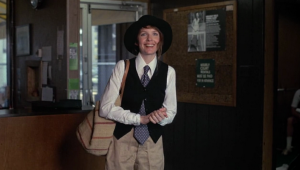On Diane Keaton’s sixty-seventh birthday, it seems only right to pay homage to one of her most memorable roles: Annie Hall. As the eponymous main character in Woody Allen’s 1970s masterpiece, Keaton is at her best as the androgynous, yet vulnerable wasp who falls into Alvy Singers’ (Allen) life just when he least expects to find love. Her daffiness and lack of conventional polish is what initially attracts Alvy to Annie, as it is often the tendency of intellectuals to be attracted to someone who is a different form of awkward than they.

Upon meeting Annie after playing a game of doubles at a public tennis court, the two strike up an affable conversation and she offers him a ride uptown. Horrified (though subconsciously endeared) by her recklessness while driving, Annie talks calmly in the face of near accident after near accident. Bonded to her by his brush with death, there is a certain level of established comfortableness that Alvy feels toward Annie. As they share a drink in her apartment, it is clear that Alvy is riveted by her oversharing of personal information, mainly with regard to her “Grammy Hall” who would most assuredly call Alvy “a real Jew.”
Alvy falls rapidly for Annie after their first date when she auditions to sing at a club. The iconic scene during which she sings “It Had To Be You” alternates between the innocence of her aura while crooning the classic and Alvy’s simultaneous awe of her as he watches on. Attracted to her because of her artlessness and warmth, the beginning of their relationship–like so many people’s–is sheer bliss. It isn’t until her winning qualities start to become her vexatious ones that Alvy begins to drive her away.
With their problems becoming more challenging to ignore, Annie Hall makes it evident that while the intellectual man is allured by a woman who is, from his view, more cerebrally deficient, he is ultimately looking for someone he can mold and influence unequivocally. Alvy’s inability to do so with Annie Hall–even after he gets her to take a number of college courses–is also part of why he will always put her on a pedestal: Because he projects his ideals upon her without ever being able to get her to fully live up to them.




















Reblogged this on Miami Swamp.